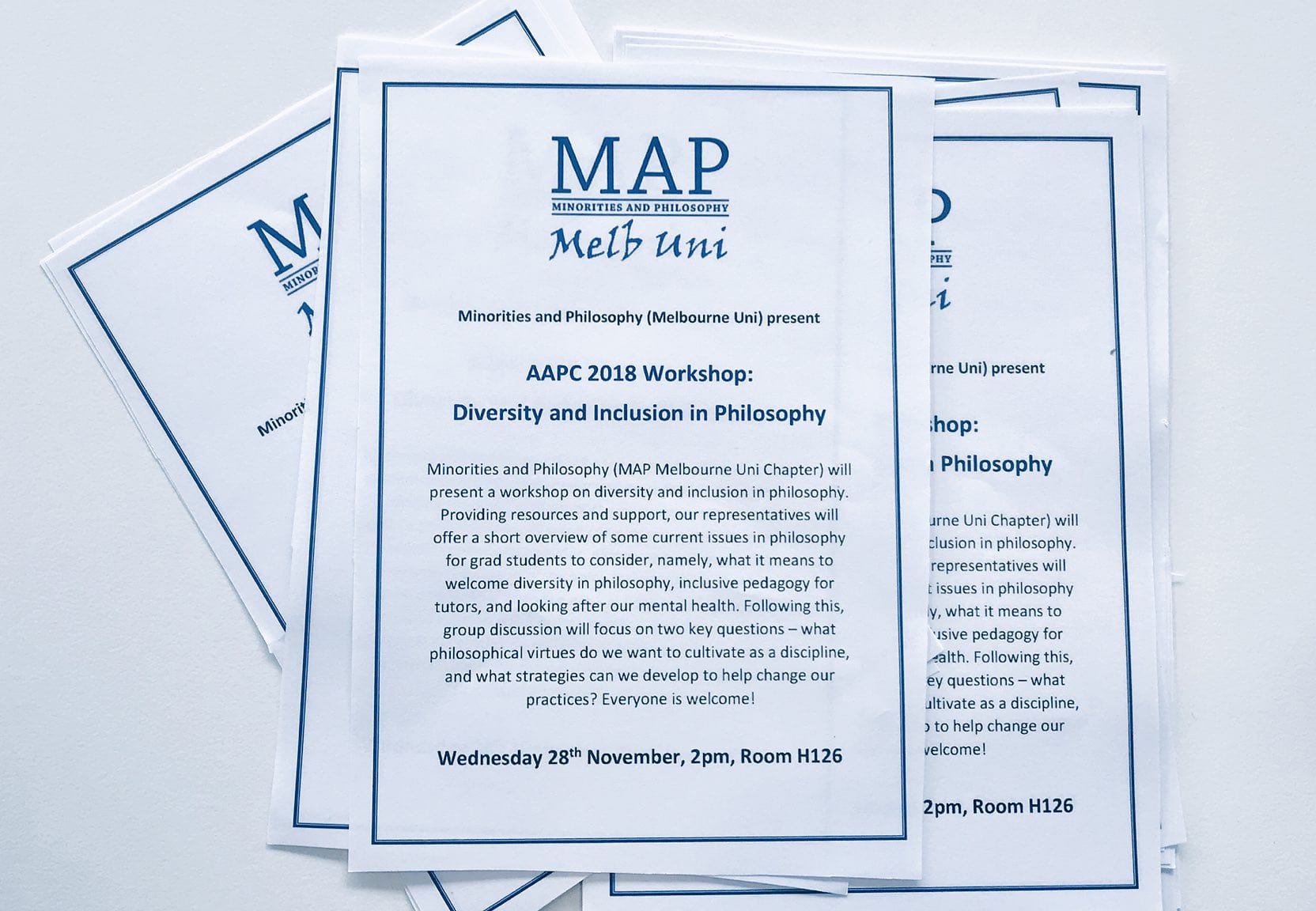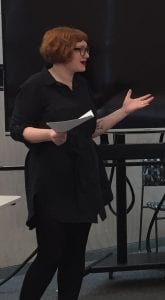
The 2018 Australian Postgraduate Philosophy Conference
Eight SHAPS graduate philosophers recently headed out to Monash to present their work at a major event on the calendar for Australian philosophy postgraduates, the annual Australasian Postgraduate Philosophy Conference (APPC). The three-day conference, hosted this year at Monash University’s Caulfield Campus, featured presentations from seven SHAPS postgraduates across six streams, including Art and Ethics, Cognitive Networks and Systems, Consciousness and Experience, Social and Moral Philosophy, Epistemic Injustice, and Social Justice. Carley Tonoli discusses the conference and some of its themes, including challenging orthodoxies, and fostering diversity in Philosophy.
Presenters from the University of Melbourne were SHAPS PhD and Masters candidates, Artem Bourov, Paul O’Halloran, Rich Phan, Paul-Mikhail Podosky, Antonia Smyth, William Tuckwell, and Lian Zhou.
PhD candidate Paul-Mikhail Podosky presented on conceptual engineering, which he describes as a field of normative enquiry aiming to improve flawed concepts – such as our concept of race or gender – by suggesting ways to alter them for the better.
“I argued that conversation is one important means by which we can implement proposed improvements to a concept, but it suffers insofar as the rules that govern good conduct in conversation allow speakers to sidestep topics that would otherwise lead to concept change if the rules were different.
“The example I used was sidestepping when discussing ‘food’ – people sidestep when a challenge is made such as ‘cows aren’t food’; [an]other example I’ve seen [is] sidestepping when it comes to conversation about what it means to be a woman, or a person of colour,” Paul-Mikhail said.
He felt the conference was of great benefit to postgraduates throughout the Australasian region.
“The comments and suggestions from the APPC audience contributed greatly to strengthening the argument I defend in my paper.
“The APPC is a melting pot of students from different universities, with different philosophical backgrounds, and there’s no better way to test your ideas than against those who think differently,” he said.
Paul-Mikhail said he felt the 30-minute time limit on presentations, whilst much shorter than most philosophy conference presentations, ultimately added overall benefit to the experience.
“The conference was arranged into sessions consisting of 30-minute talks.
“Now, while some might not like this, given that 30 minutes is far too short to offer a substantial argument, I think this fails to see the overall benefits of offering a larger number of people the opportunity to present their work.
“Much of the ideas that are generated from conferences set up in this way come from the conversations that happen between sessions, and the events that precede the day’s end,” he said.
Fellow SHAPS PhD candidate, Paul O’Halloran said he also found collegiality and friendship building an important part of the event.
“You can take chances in expressing risky new ideas in a trusting environment.
“Some new friends and strengthening the friendships I already have—that is the main benefit,” he said.
Paul O’Halloran’s own presentation focused on art appropriation, and questioned the value of artistic works resulting from appropriation.
“When someone takes an idea from someone else and puts it in their own work, it creates a puzzle: should we value art copies in the same way we value the original?
“I discussed a way of valuing art [that] addresses some of the issues caused when artists appropriate the work of others,” he said.
Conference keynote speakers were Dr Bronwyn Finnigan (ANU), Dr Anik Waldow (University of Sydney), and Dr Suzy Killmister (Monash University), and panel discussions included a Challenging Orthodoxies session, and a session run by the Melbourne chapter of Minorities and Philosophy (MAP).
The Challenging Orthodoxies session addressed whether the philosophical community should limit the kinds of arguments and topics regarded as an acceptable expression of philosophical scholarship, and whether this limit should depend the political context in which the argument is made.
The topics covered during the MAP panel were, ‘what it means to welcome diversity in philosophy’, ‘how philosophy as a discipline can practice inclusive pedagogy’, and ‘are we looking after our mental health?’
Established this year by Masters candidate Antonia Smyth and a group of fellow Philosophy postgraduate students in SHAPS, the Melbourne MAP chapter is part of the worldwide 121-chapter MAP network, which aims to examine and address issues of minority participation in academic philosophy.

Together with serving as a panel member in the MAP discussion, Antonia Smyth also gave her own presentation, which centered on epistemic injustice in legal and medical institutions in the case of compulsory psychiatric treatment.
She said the MAP panel discussion was well attended, and that the group is planning to develop ideas raised during the discussion into a longer workshop for tutors to use in the future.
“It was really good to see that there’s a whole community of postgrads across Australian Universities who care about this stuff.
“I think everyone who attended already had an interest in promoting representation in their own departments and tutorials, so people were really able to share ideas that have worked for them in their own practice.
“Several people spoke about their own experiences of discrimination in philosophy departments and I think some people were probably motivated to attend because of that,” Ms Smyth said.
“There was a really great, extended discussion around the things that postgrads are doing when they tutor classes to encourage participation from people who may not feel like they really belong in them, and I felt like that exchange was a real highlight of the session,” she said.
Paul-Mikhail Podosky said he derived great benefit from the panel discussions, particularly the Challenging Orthodoxies session.
“We heard two perspectives from philosophers who have been at the receiving end of negative commentary due to the nature of their work, both had faced either threats or discrimination as a result … they offered interesting insights into future directions of controversial topics,” he said.
Paul O’Halloran echoed these sentiments, saying he felt the highlight of the conference was exposure to a range of challenging ideas.
“A good example of challenging ideas for me was Ben Kilby’s Epistemic Injustice in Education.
“Ben developed some recent work by Karin Murris who argues that a teacher can hold prejudicial beliefs about the knowledge-producing capabilities of children and this inhibits the teacher’s ability to engage with children in a way that would allow them—teachers and students—to learn together.
“Ben showed how strategies could be applied to address this issue. This resonates with some social research in Victoria that showed a teacher’s belief in their students’ ability to learn was a key driver of student outcomes,” he said.
By all reports, the conference was successful and beneficial to all postgraduates involved, and all interviewees said they were already looking forward to participating again next year.